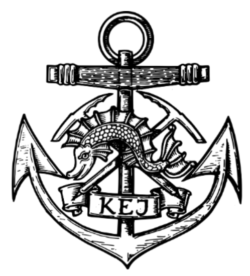A year ago I wrote a post on the nautical origins of some of the phrases we use every day.
Things like the title of this post – taking the cat o’ nine tails (a whip with nine knotted cords) out of its bag to be used as punishment for undisciplined sailors.
I thought it would be interesting to delve in to this a little more and see how many of these you were aware of and the response has been huge. There are so many, and I only listed 9 in my initial post, but was soon inundated with more.
And so, without further ado, here we go…

Sailing Too Close To The Wind
Literally speaking, it means to sail as close to the wind as you can, but it also takes on another meaning in that you’re staying very close to an issue that could end up being dangerous or illegal.
Change Tack
On a sailing vessel, the tack is the lower leading corner of the sail, pointing the direction the ship is heading. So when a yacht or ship changes course, it’s changing from one tack to another.In modern speech, changing tack is trying a different method to deal with a problem.
Three Sheets To The Wind
In nautical terms the ‘sheet’ is the rope controlling sail trim.
A sail is said to be sheeted to the wind, when it is set to backfill..
A backfilled jib is usually bad, but in a storm, if a ship were ‘hove to’ and at the mercy of winds and weather, the helm is lashed to windward, and the jib(s) are sheeted to the windward side of the ship (sheeted to the wind) causing the ship to sit sideways to the wind and waves to minimise the distance the ship is blown off course during a storm.
As a storm progresses, more force is required to hold the ship in position and additional jibs are sheeted to the wind to keep the ship on balance.
A ship with three jibs sheeted would be sitting sideways to the wind and waves in stormy weather, causing it roll wildly from side to side and in constant danger of capsize.
And so in modern usage, 3 sheets to the wind means drunk and all over the place!
Well, you can see why!

The Cut Of Your Jib
“I like the cut of your jib”
Something I usually say to new friends made whilst drunk in pubs because I like to pretend I’m a pirate.
The jib of a sailing ship is a triangular sail set between the foretopmast head and the jib boom of a tall ship. Each country had its own style of sail and so the nationality of a sailing ship could be determined from the jib and you would know if they were friend or foe!
Showing Your True Colours
Colours in this instance refers to the flag or ensign flown by a ship.
Pirates often used to sail under false colours and fly a friendly flag, in order to sail within range of potential targets without arousing suspicion. Once within range they would unfurl their ‘true colours’.
Now? We use it when somebody has been misleading, sneaky or the opposite of how they have been portrayed!

Pipe Down
How many times have you heard people shout “pipe down” when they want people to be quiet. I’m in cadets, so this is a regular occurrence, but I never knew where it came from until I joined.
Pipe Down was the last signal from the Boatswain’s call every evening, which meant it was time to ‘pipe down’, be quiet and go to bed.
By & Large
Referring to the bigger picture…
“By and large XYZ is amazing”
On a tall ship the word ‘by’ meant in to the wind and large meant ‘off the wind’ and so ‘by and large’ the ship handled well!
A Loose Cannon
So there we have it, a few more phrases we use regularly without thinking about where they’ve come from!What others do you use that you know to have a nautical origin?

